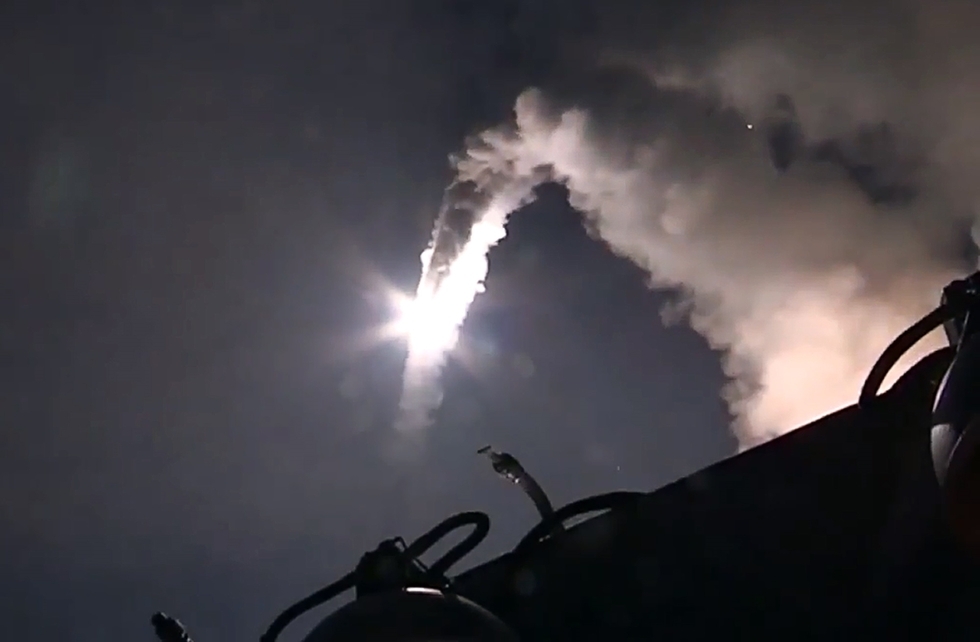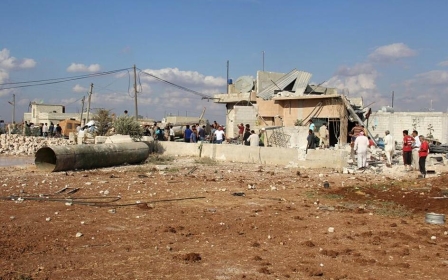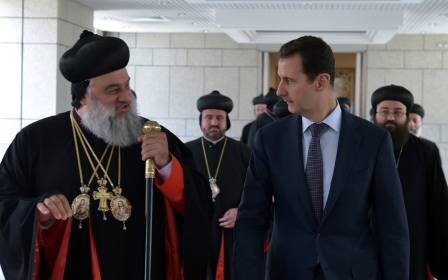Al-Nusra calls on Caucasus fighters to seek revenge against Russians

The head of al-Qaeda's Syrian affiliate has called on fighters in the Caucasus to attack Russian civilians and soldiers in retaliation for Moscow's airstrikes in Syria.
"If the Russian army kills the people of Syria, then kill their people. And if they kill our soldiers, then kill their soldiers. An eye for an eye," Abu Mohamed al-Jolani, the head of al-Nusra Front, said in an audio recording released late on Monday.
He pledged that Moscow's air war in Syria, which began on 30 September, would have dire consequences for Russia.
It comes as rockets hit Moscow's embassy in Damascus where demonstrators had gathered to back the intervention on Tuesday.
Russian Foreign Minister Sergey Lavrov said the shelling was an "act of terror" aimed at intimidating those who supported "fighting terrorism".
"It is a clear act of terror meant to scare supporters of fighting terrorism," Lavrov told reporters in Moscow, after two rockets had struck the Russian embassy compound but did not cause any fatalities.
On Tuesday, Israeli artillery also targeted Syrian army posts in retaliation after two rockets fired from Syria hit the Israeli-occupied area of the Golan Heights, the Israel's military said.
The developments came a day after US-led coalition forces air-dropped ammunition to the Syrian Arab Coalition (SAC) battling rebels near the Islamic State's (IS) northern stronghold of Raqqa.
"The war in Syria will make the Russians forget the horrors that they found in Afghanistan," Jolani said. "They will be shattered, with God's permission, on Syria's doorstep."
Jolani also called on armed groups to "hurl hundreds of rockets" daily at villages inhabited by the Alawite minority, the sect from which President Bashar al-Assad hails.
"When they will stop attacking our village and cities, we will stop attacking theirs."
Al-Nusra bounty for Assad
Jolani said he would pay "three million euros ($3.4 million) for anyone who can kill Bashar al-Assad and end his story".
"How long must Muslims delay their rights and shed their blood for a man who loves his power?"
Russia has said its aerial raids are targeting IS, a rival of al-Nusra, but other rebel groups have also been heavily targeted by Russian strikes.
Moscow's strikes have concentrated on areas in northwestern Syria where al-Nusra has a powerful presence, mostly in the province of Idlib.
The US-led air coalition fighting IS in Syria has also targeted al-Nusra on several occasions.
Jolani called on armed opposition groups to set aside their differences until both air wars had been defeated.
"Delay the disputes until the demise and smashing of the Western Crusader and Russian campaign on Syrian land," he said.
North Caucasus
The North Caucasus is a predominantly Muslim Russian territory that includes Chechnya, from where about 2,000 fighters have joined the fighting in Syria.
In September, IS declared the formation of a wilayat, or province, in the region – a claim dismissed by Chechnyan leader Ramzan Kadyrov, who is one of Vladimir Putin’s strongmen.
At the time, Kadyrov called the declaration of an IS province in the region a "bluff", but also said the threat of the IS "virus" was not being ignored.
He has since said that his troops are ready and willing to march on Syria to fight IS.
Jolani’s call to action comes a day after Moscow said that Russian men involved in a suspected “terrorist plot” to bomb the Moscow transport network had been trained by IS in Syria, AP reported, citing Russian intelligence sources.
The intelligence agency added that the men had arrived in Moscow before the Russian airstrikes on Syria began.
Moscow has long felt pressure from the Caucasus. An al-Qaeda affiliate, Caucasus Emirate, has its roots in the independence movement that started in Chechnya in the 1990s.
It was responsible for the 2010 attack on Moscow’s metro system that killed dozens of civilians. The group has not yet declared a shift of allegiance to IS.
Middle East Eye propose une couverture et une analyse indépendantes et incomparables du Moyen-Orient, de l’Afrique du Nord et d’autres régions du monde. Pour en savoir plus sur la reprise de ce contenu et les frais qui s’appliquent, veuillez remplir ce formulaire [en anglais]. Pour en savoir plus sur MEE, cliquez ici [en anglais].




